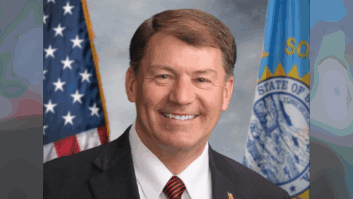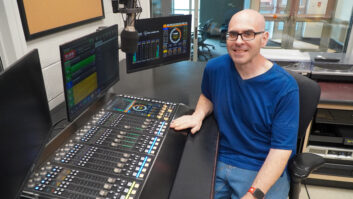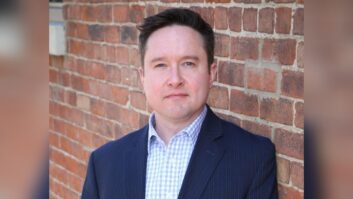Commercial radio programmers might envy Jay Kernis’ problems. As NPR’s senior vice president for programming, Kernis is riding high with skyrocketing ratings.
In March, according to Arbitron’s nationwide estimates for Fall 2001, NPR announced record audiences, with 19.5 million weekly listeners tuning in to NPR programming on public radio stations each week – a 19-percent increase compared with fall 2000 figures.
Arbitron’s nationwide estimates for fall 2001 showed an average gain of 19 percent for NPR newsmagazines, 32 percent for NPR talk programs and 15 percent for NPR entertainment programs. The problem is, such growth has not been across-the-board. The cume for NPR’s classical programs only increased a modest 6 percent. Jazz programming dropped 5 percent.
The disparate numbers reflect a simmering shift in NPR’s potpourri of news, culture and entertainment programs. Kernis, who started his career at NPR, has returned after a 14-year career as a TV producer for CBS. He is charged with the task of transforming the hodgepodge of programs into a more coherent programming philosophy.
Strategic plan
“This comes from (NPR’s) strategic plan,” said Kernis. “Basically, this acknowledges how people use radio. When most people use radio, they go to a particular station expecting a specific kind of programming. When you go to a news station, you expect to find news. By moving the focus from programs to programming, we’re trying to achieve greater coherence.”
In February, Kernis sent out a memo to precipitate discussion on how to go about implementing this. On April 11, after extensive consultations throughout the public radio system, a reorganization and realignment of cultural programming was announced.
The upshot? Fifteen jobs cut from cultural programming – and a heated debate among employees, critics and other NPR-watchers over whether the organization is shifting emphasis to news/talk and, in doing so, losing sight of its mission.
“They’re letting go of an aspiration that public radio’s had for a long time – to be a national stage, to be a place for the exchange of culture,” said Steve Rathe, president of Murray Street Productions, the producers of NPR’s “Jazz From Lincoln Center.”
“Instead of serving our greatest aspirations, they’re looking to serve our greatest audiences.”
For Rathe, the heart of the matter is a debate between quality and quantity.
“The question is, how do you define the public interest and how do you define the service?” said Rathe. “NPR has said that they’re interested in serving more people more often. It’s hard to argue with that except to consider other valuable services that NPR provides.”
In practical terms, Rathe sees this as backing away from offering actual performances to providing features about such cultural events to enhance news programs.
“They’re completely right to enrich the news programming and get the maximum exposure for the cultural stories,” said Rathe. “But reportage should not be mistaken for the thing itself.”
Particularly disheartening for Rathe is that fact that these changes come as JFLC listenership surges. While other NPR jazz programs have watched their numbers dip, JFLC has seen a 27-percent jump in cume. Despite such success, he expects that JFLC will be cut from NPR’s lineup next year.
Inventory
“It’s a tough time for cultural producers,” said Rathe. “We’re faced with the necessity – and opportunity – to rethink everything we’ve done.
“It’s not entirely bad. We’re going to be hearing from audiences. We’ll be looking closely at what they want and the way they want it delivered.”
Bruce Drake, NPR’s vice president for news and information, says that from the listener’s perspective, such changes are a net gain for cultural programming.
“Inside NPR, we see a cultural division and news division,” said Drake. “The station surveys showed that this is something of a false dichotomy. When stations think of cultural programming, they think of both performances and interviews with performers. There’s no better way to get cultural coverage than getting such features on ‘Morning Edition’ and ‘All Things Considered.’ They reach many millions of listeners.”
Michael Arnold, director of programming for NPR member station WUNC(FM) and chairman of the Public Radio Program Directors Association, also sees this as a change for the better.
“Many NPR cultural shows may have won awards, but they did very little to truly serve the audience or any art form very well,” said Arnold. “Most of them wound up being aired late at night on the weekends on stations. For some reason, very little was done to make sure that these programs actually served an audience. (That’s) a horrible waste of production time and talent – particularly for an organization with limited resources.”
Mission misapprehension
Kernis believes that much of the criticism comes from a misapprehension of NPR’s mission. The call, he says, is to serve, not create listeners.
“I know there is that expectation,” said Kernis. “I think we can support a classical music audience. I don’t know that we can create a classical music audience. I think that happens in the home, in schools. There’s nothing in the mission that says we’re supposed to do programming that no one hears.”
Moreover, the changes have come at the direction of member stations and the listeners who support them. This is not a direction he’s given to NPR’s programming but rather one that the system itself is taking.
“I don’t tell the stations how to program their schedules,” said Kernis. “I just hope they find value in what NPR produces and that they purchase it.”
Steve Curwood is executive producer of NPR’s environmental news program “Living on Earth” and host of the network’s “World of Opera.” Ironically, he will be departing from “World of Opera” because the show is being expanded from 26 to 52 weeks and the added commitment would take away from his news work.
With his perspective of having a foot in both news and cultural programming, he sees a need for a wider interpretation of NPR’s mission, especially given the economic pressures at member stations.
“Compared to other, foreign public broadcasting services, NPR gets precious little government support,” said Curwood. “There’s constant pressure on stations to boost their numbers so they can attract more individual donors and underwriters. The station manager looking at how to keep the station alive has a better shot with a news/talk format than with a cultural format. That’s a fact of economic life.”
But dealing with such realities is different from being defined by them.
“The danger here is that if we put too much emphasis on audience numbers without looking qualitatively at what we’re doing, we’ll take steps just to attract that audience,” said Curwood. “Commercial radio gives a clear example of what happens when you’re purely numbers-driven.”
The trick, said Curwood, is finding a viable midground.
“What’s important is to strike a balance – to serve enough people well, to keep it economically viable and stay significant both socially and from a journalistic standpoint.”







